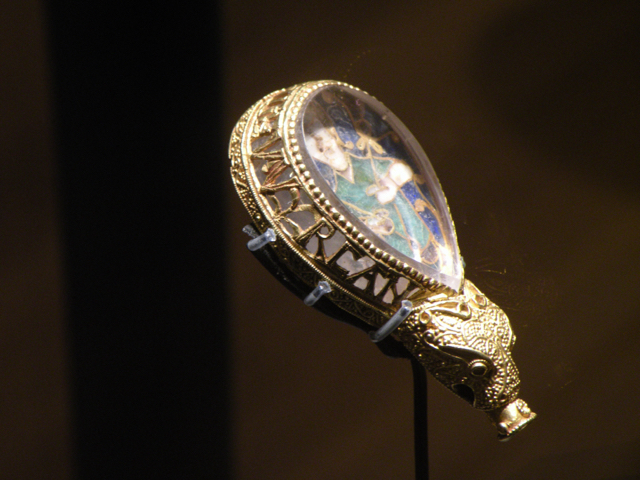In the traditions of the Roman Catholic, Anglican, and Orthodox churches, October 26 is the feast of St. Alfred the Great, King of the West Saxons from 871 to 886 and then of a unified Anglo-Saxon kingdom until his death on October 26, 899. He is remembered largely for his success in warding off Viking raids, recovering London after its occupation by Vikings and making it the capital of Saxon England, convincing Vikings to convert to Christianity, establishing a uniform law code for his kingdoms, and — what is important for us today — supporting education at a high level, and pursuing it for himself. He is the only English monarch styled “the Great”.
Thanks to a contemporary biographer, Asser, commissioned to keep records for Alfred’s court, we know far more about Alfred than any other contemporary English rulers. The youngest child of King Æthelwulf of Wessex, Alfred became king of Wessex after the short reigns of his four older brothers. Alfred’s father and brothers had established alliances between Mercia, Wessex, and Kent; Alfred cemented their union to push back the Danes into Northumbria or East Anglia, freeing most of southern England from their control. He restructured the defenses of towns in southern England to block passage of Viking ships upriver, and expanded the road system so that he could move troops quickly to meet attacks. With his defenses in place, he negotiated peace with the Vikings, who agreed to leave Alfred’s kingdom alone and apply their laws only in their own territories north and east of London. Alfred also negotiated treaties and alliances with the Celtic princes of Wales, and his correspondents included the patriarch of Jerusalem and the current popes, and he worked to reestablish churches and monastic houses destroyed by the wars among the kingdoms or with the Vikings.
Despite his military and poltical duties, Alfred did not neglect the spiritual and education needs of his people. He proposed a new English-language-based curriculum for any who wished to learn, with Latin education available for those studying for holy orders. To support this, he gathered around him a group of scholars to translate from Latin into Anglo-Saxon those works “most necessary for men to know”.
But he also found time himself to study and use what he learned as he governed his kingdom. He prefaced his law codes with his own translations of the Ten Commandments and the Apostolic Letter in Acts 15, tracing the continuity of law from Mosaic origins to his own time, emphasizing the work of Christ to temper the law with mercy. He translated Pope Gregory the Great’s encyclical on Pastoral Care and distributed it to his bishops to help them train and supervise priests for the reform of the church in England. He translated Boethius’ Consolation of Philosophy and the first third of the Book of Psalms into Anglo-Saxon. He read and translated the accounts of Orosius, a student of St. Augustine, who traveled from Hippo to Alexandria and Jerusalem, and who recorded both his travels and the histories of peoples he met.
What impresses me most here is how widely Alfred’s interests ranged. He believed that he was entrusted with both the temporal and spiritual welfare of his people, and neither of these could be addressed superficially, but required research into past efforts, contemplation of the results, and careful contrustruction of projects to solve them, with due consideration of the advice of his own councilors.
Þæt is nū hraðost to seċġenne þæt iċ wilnode weorðfullīċe to libbenne þā hwīle þe iċ lifde, and æfter mīnum līfe þām mannum tō lǣfanne þe æfter mē wǣren mīn ġemynd on gōdum weorcum.
In short, I wanted to live honorably as long as I lived, and leave behind, for the people who would come after me, the memory of me in good works.
(From Alfred’s translation of Boethius’ Consolation of Philosophy, ch. 17.)

